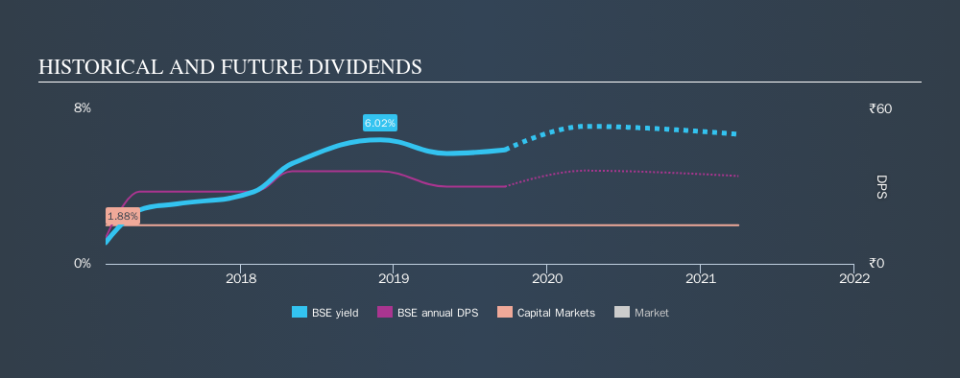Is BSE Limited's (NSE:BSE) 5.5% Dividend Worth Your Time?

Could BSE Limited (NSE:BSE) be an attractive dividend share to own for the long haul? Investors are often drawn to strong companies with the idea of reinvesting the dividends. Yet sometimes, investors buy a stock for its dividend and lose money because the share price falls by more than they earned in dividend payments.
In this case, BSE pays a decent-sized 5.5% dividend yield, and has been distributing cash to shareholders for the past three years. A 5.5% yield does look good. Could the short payment history hint at future dividend growth? The company also returned around 4.4% of its market capitalisation to shareholders in the form of stock buybacks over the past year. Some simple research can reduce the risk of buying BSE for its dividend - read on to learn more.
Click the interactive chart for our full dividend analysis
Payout ratios
Companies (usually) pay dividends out of their earnings. If a company is paying more than it earns, the dividend might have to be cut. As a result, we should always investigate whether a company can afford its dividend, measured as a percentage of a company's net income after tax. In the last year, BSE paid out 86% of its profit as dividends. Paying out a majority of its earnings limits the amount that can be reinvested in the business. This may indicate a commitment to paying a dividend, or a dearth of investment opportunities.
Remember, you can always get a snapshot of BSE's latest financial position, by checking our visualisation of its financial health.
Dividend Volatility
Before buying a stock for its income, we want to see if the dividends have been stable in the past, and if the company has a track record of maintaining its dividend. It has only been paying dividends for a few short years, and the dividend has already been cut at least once. This is one income stream we're not ready to live on. During the past three-year period, the first annual payment was ₹10.00 in 2016, compared to ₹30.00 last year. This works out to be a compound annual growth rate (CAGR) of approximately 44% a year over that time. The dividends haven't grown at precisely 44% every year, but this is a useful way to average out the historical rate of growth.
So, its dividends have grown at a rapid rate over this time, but payments have been cut in the past. The stock may still be worth considering as part of a diversified dividend portfolio.
Dividend Growth Potential
Given that the dividend has been cut in the past, we need to check if earnings are growing and if that might lead to stronger dividends in the future. Earnings have grown at around 6.6% a year for the past five years, which is better than seeing them shrink! Past earnings growth has been decent, but unless this is one of those rare businesses that can grow without additional capital investment or marketing spend, we'd generally expect the higher payout ratio to limit its future growth prospects.
Conclusion
To summarise, shareholders should always check that BSE's dividends are affordable, that its dividend payments are relatively stable, and that it has decent prospects for growing its earnings and dividend. First, we think BSE has an acceptable payout ratio. Second, earnings growth has been ordinary, and its history of dividend payments is chequered - having cut its dividend at least once in the past. BSE might not be a bad business, but it doesn't show all of the characteristics we look for in a dividend stock.
Earnings growth generally bodes well for the future value of company dividend payments. See if the 3 BSE analysts we track are forecasting continued growth with our free report on analyst estimates for the company.
If you are a dividend investor, you might also want to look at our curated list of dividend stocks yielding above 3%.
We aim to bring you long-term focused research analysis driven by fundamental data. Note that our analysis may not factor in the latest price-sensitive company announcements or qualitative material.
If you spot an error that warrants correction, please contact the editor at editorial-team@simplywallst.com. This article by Simply Wall St is general in nature. It does not constitute a recommendation to buy or sell any stock, and does not take account of your objectives, or your financial situation. Simply Wall St has no position in the stocks mentioned. Thank you for reading.

